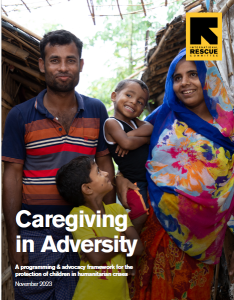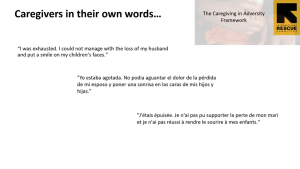The caregiving in Adversity Framework.
The demographics are clear—children and adults with caregiving responsibilities constitute the majority of affected populations served by the humanitarian sector. Children affected by humanitarian crises often face increased risks and harm. At the same time, caregivers who typically provide a first line of defense for children may themselves experience a range of increased stressors and hardships that make it more difficult for them to protect children in their care. The IRC launched the caregiving adversity framework to support practitioners, policy makers, academics and other actors in their work to support caregivers. The framework can be accessed in the links below in English, French, Arabic and Spanish.

IRC has invested in supporting parents in everyday practice, generating evidence to inform solutions and implementing these evidence-based interventions in over 20 countries in the last 10 years.
We have seen a reduction in harsh parenting and other forms of child maltreatment not only from the trials we have conducted but also from our routine M and E data, through which we monitor changes in outcomes, make adaptations and monitor any gaps through the feedback from parents. Amidst ongoing war and displacement in different parts of the world, and protracted crises affecting children and their caregivers, our collective efforts to support children thrive is more than the work of a day and as challenging as ever to achieve.
Our work to support parents is through partnerships such as the Global Initiative to Support Parents (GISP), our Caregiving in Adversity Framework, and a follow up on our commitments and efforts for the Bogota Ending Violence against Children Ministerial meeting held in November last year.
IRC’s support to caregivers includes our interventions and efforts such as Families make the Difference, Ahlan Simsim that focuses on early childhood, Growing Strong Together that looks at preventing recruitment and use of children in armed conflict and addressing the co-occurrence of child maltreatment and violence against women.
At the IRC, we work with multiple actors in nutrition, SRH, social protection, or education as entry points for increasing support to parents and caregivers in collaboration with Child Protection actors.
Parenting support allows us to work together, across our silos, to support multiple populations and achieve multiple goals at the same time.
